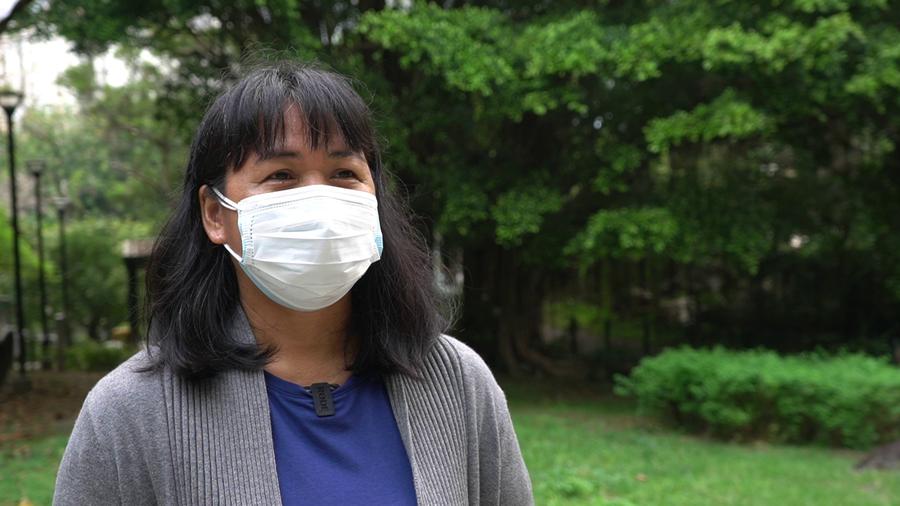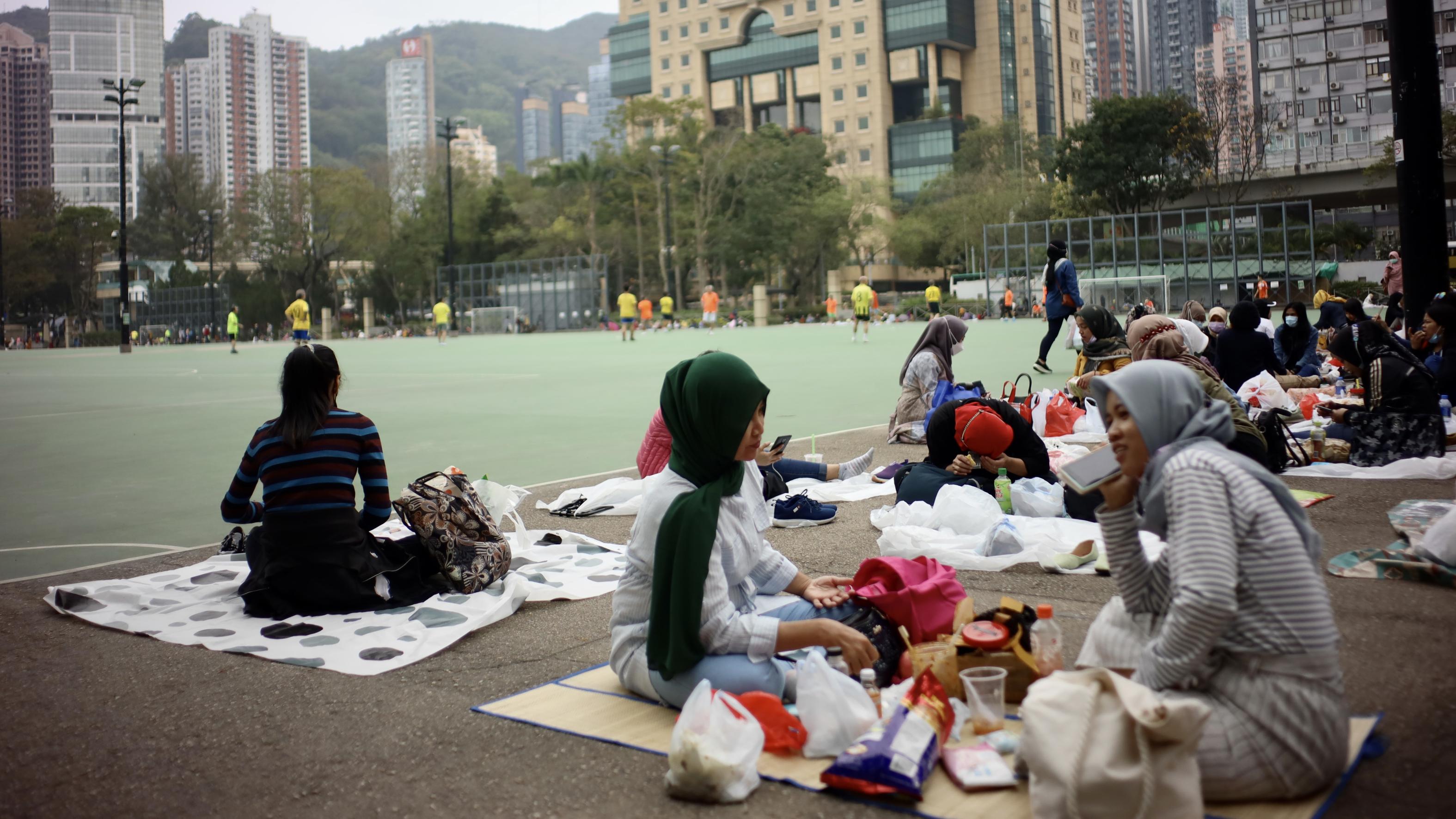 This photo shows Marites Palma, founder of Social Justice for Migrant Worker, a three-year old NGO that supports domestic helpers. (JAN YUMUL / CHINA DAILY)
This photo shows Marites Palma, founder of Social Justice for Migrant Worker, a three-year old NGO that supports domestic helpers. (JAN YUMUL / CHINA DAILY)
Filipina migrant worker Marites Palma spends most of her Sundays distributing food, medicines and toiletries to household workers in Hong Kong who are serving COVID-related quarantine. Though she gets a break only over the weekends from her job as a domestic helper, she prefers to devote that spare time to helping her fellow foreign workers.
Palma is the founder of Social Justice for Migrant Workers, a three-year-old NGO that supports domestic helpers. She said helping her fellow domestic workers is more urgent now as the pandemic has been especially difficult for the migrant household help.
Many (domestic) workers are not allowed to go out because employers are very scared of the (pandemic). (They think) that if the workers go out and mingle with other domestic workers, they will also acquire COVID. But the employers also go out, so what’s the point (of such restriction)?
Marites Palma, founder of Social Justice for Migrant Workers
Palma said most of the domestic helpers work longer hours as they have to clean their employers’ house more often because the pandemic has compelled people to be more conscious of hygiene. Employers also require their helpers to wear mask and use hand sanitizer but often refuse to pay for the items, forcing the helpers to dip into their already tight budgets. Some helpers have also seen their contracts get abruptly terminated after they tested positive for COVID-19.
Those who are not fired are sent to isolation units. But Palma said that many employers do not provide the quarantined workers with enough food, medicines and other essentials that they require. Some new helpers who came to Hong Kong in the past two years and had to go through quarantine upon their arrival also suffered the same plight.
This is why Palma and other members of Social Justice decided to pool their money so that they can send care packages to the quarantined helpers every weekend.
ALSO READ: HK govt: FDH minimum wage unchanged
“Many (domestic) workers are not allowed to go out because employers are very scared of the (pandemic). (They think) that if the workers go out and mingle with other domestic workers, they will also acquire COVID. But the employers also go out, so what’s the point (of such restriction)?” Palma said, noting that this is another instance of discrimination against domestic helpers.
There are over 300,000 foreign domestic workers in Hong Kong. More than 90 percent of them are women, and mostly hail from the Philippines and Indonesia. The migrant workers come to the city hoping to earn enough money to provide a better life for their families back home. Palma has the same story. The single mother came to Hong Kong more than 20 years ago to support her daughter.
But Palma has seen how some helpers were abused by their employers. She established Social Justice “because when I (first) came here to Hong Kong… I was not treated well by my (then) employers. I was exploited, and during that time, I (met) many domestic workers who (were also abused) by their employers. This opened my eyes (and encouraged me) to empower myself”.
 Foreign domestic helpers gather at Victoria Park, Causeway Bay, Hong Kong on March 15, 2021. (EDMOND TANG/CHINA DAILY)
Foreign domestic helpers gather at Victoria Park, Causeway Bay, Hong Kong on March 15, 2021. (EDMOND TANG/CHINA DAILY)
The experience spurred Palma to become an advocate for migrant workers’ rights. In 2019, she became a fellow of Resolve Foundation, a non-profit group that aims to empower future community leaders and promote an inclusive Hong Kong. It is through this fellowship that Palma was able to establish Social Justice. She started by creating an online group of Filipina domestic helpers through Facebook.
Thanks to social media networking, Marites Palma and other migrant workers can communicate with each other, providing support as needed. They coordinate with the Philippine consulate to help workers who were abused and/or have labor disputes. They also refer job openings to those looking for new employers
“Our (group’s) mission is to empower (migrant workers) and to help them elevate their lives,” Palma said. She also noted that since most of the workers had left the Philippines to support their families, it is also part of Social Justice’s mission “to help not only ourselves, but also our families’.
Thanks to social media networking, Palma and other migrant workers can communicate with each other, providing support as needed. They coordinate with the Philippine consulate to help workers who were abused and/or have labor disputes. They also refer job openings to those looking for new employers. Prior to the pandemic, Palma organized hiking activities to promote good physical health among the helpers.
The pandemic has pushed Social Justice to implement other projects like food distribution. While there are some kind-hearted donors, Palma said most of the money raised has come from the members’ own pockets.
“Even though we have (a small) salary, we have the heart to share (what we have) to our domestic fellow domestic workers,” Palma said.
READ MORE: HK Labour and Welfare Bureau: No discrimination in FDH tests
She said that Social Justice runs in the spirit of volunteerism. More than just contributing money, all members work together in offering necessary help. For example, whenever Palma posts on Facebook that they need funds to help a migrant worker, many people send her private messages, asking how they can contribute either in cash or kind.
“(There is) a negative and a positive (side in this pandemic). (The) negative side is that we are suffering. But the positive side is that we see the love, the compassion and kindness from our members and from among Filipinos and from other expats who are supporting (our group),” Palma said.


